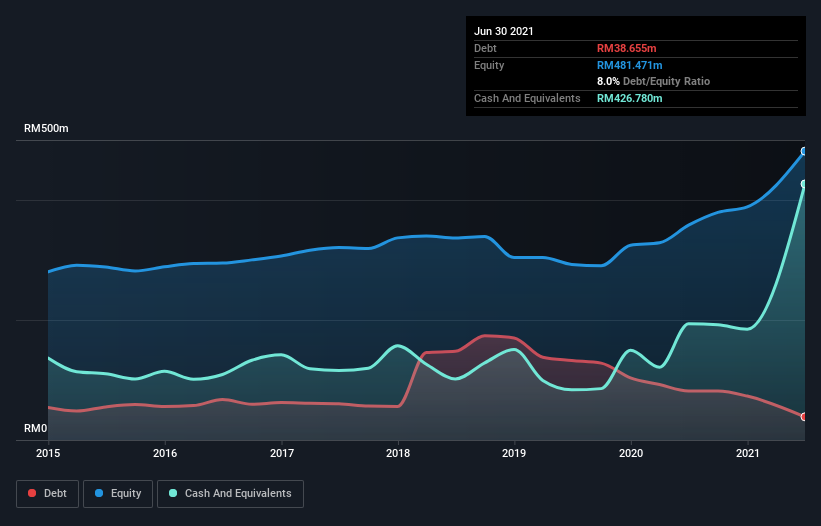
Legendary fund manager Li Lu (who Charlie Munger backed) once said, 'The biggest investment risk is not the volatility of prices, but whether you will suffer a permanent loss of capital.' It's only natural to consider a company's balance sheet when you examine how risky it is, since debt is often involved when a business collapses. Importantly, KUB Malaysia Berhad (KLSE:KUB) does carry debt. But the real question is whether this debt is making the company risky.
Why Does Debt Bring Risk?
Debt and other liabilities become risky for a business when it cannot easily fulfill those obligations, either with free cash flow or by raising capital at an attractive price. If things get really bad, the lenders can take control of the business. While that is not too common, we often do see indebted companies permanently diluting shareholders because lenders force them to raise capital at a distressed price. Of course, plenty of companies use debt to fund growth, without any negative consequences. When we think about a company's use of debt, we first look at cash and debt together.
Check out our latest analysis for KUB Malaysia Berhad
What Is KUB Malaysia Berhad's Debt?
You can click the graphic below for the historical numbers, but it shows that KUB Malaysia Berhad had RM38.7m of debt in June 2021, down from RM81.8m, one year before. But it also has RM426.8m in cash to offset that, meaning it has RM388.1m net cash.

How Healthy Is KUB Malaysia Berhad's Balance Sheet?
The latest balance sheet data shows that KUB Malaysia Berhad had liabilities of RM111.5m due within a year, and liabilities of RM50.7m falling due after that. Offsetting this, it had RM426.8m in cash and RM35.8m in receivables that were due within 12 months. So it can boast RM300.3m more liquid assets than total liabilities.
This surplus strongly suggests that KUB Malaysia Berhad has a rock-solid balance sheet (and the debt is of no concern whatsoever). Having regard to this fact, we think its balance sheet is as strong as an ox. Simply put, the fact that KUB Malaysia Berhad has more cash than debt is arguably a good indication that it can manage its debt safely.
On top of that, KUB Malaysia Berhad grew its EBIT by 80% over the last twelve months, and that growth will make it easier to handle its debt. When analysing debt levels, the balance sheet is the obvious place to start. But it is KUB Malaysia Berhad's earnings that will influence how the balance sheet holds up in the future. So if you're keen to discover more about its earnings, it might be worth checking out this graph of its long term earnings trend.
But our final consideration is also important, because a company cannot pay debt with paper profits; it needs cold hard cash. While KUB Malaysia Berhad has net cash on its balance sheet, it's still worth taking a look at its ability to convert earnings before interest and tax (EBIT) to free cash flow, to help us understand how quickly it is building (or eroding) that cash balance. In the last two years, KUB Malaysia Berhad created free cash flow amounting to 8.7% of its EBIT, an uninspiring performance. For us, cash conversion that low sparks a little paranoia about is ability to extinguish debt.
Summing up
While it is always sensible to investigate a company's debt, in this case KUB Malaysia Berhad has RM388.1m in net cash and a decent-looking balance sheet. And it impressed us with its EBIT growth of 80% over the last year. So we don't think KUB Malaysia Berhad's use of debt is risky. When analysing debt levels, the balance sheet is the obvious place to start. However, not all investment risk resides within the balance sheet - far from it. To that end, you should learn about the 3 warning signs we've spotted with KUB Malaysia Berhad (including 1 which can't be ignored) .
If you're interested in investing in businesses that can grow profits without the burden of debt, then check out this free list of growing businesses that have net cash on the balance sheet.
Valuation is complex, but we're here to simplify it.
Discover if KUB Malaysia Berhad might be undervalued or overvalued with our detailed analysis, featuring fair value estimates, potential risks, dividends, insider trades, and its financial condition.
Access Free AnalysisThis article by Simply Wall St is general in nature. We provide commentary based on historical data and analyst forecasts only using an unbiased methodology and our articles are not intended to be financial advice. It does not constitute a recommendation to buy or sell any stock, and does not take account of your objectives, or your financial situation. We aim to bring you long-term focused analysis driven by fundamental data. Note that our analysis may not factor in the latest price-sensitive company announcements or qualitative material. Simply Wall St has no position in any stocks mentioned.
Have feedback on this article? Concerned about the content? Get in touch with us directly. Alternatively, email editorial-team (at) simplywallst.com.
About KLSE:KUB
KUB Malaysia Berhad
An investment holding company, engages in the business of importing, storing, bottling, marketing, trading, and distributing liquefied petroleum gas (LPG) for household and industrial use under the Solar Gas brand name in Malaysia.
Flawless balance sheet, good value and pays a dividend.
Market Insights
Community Narratives



